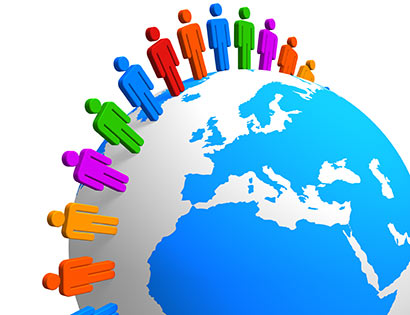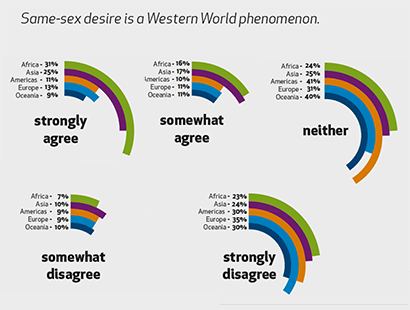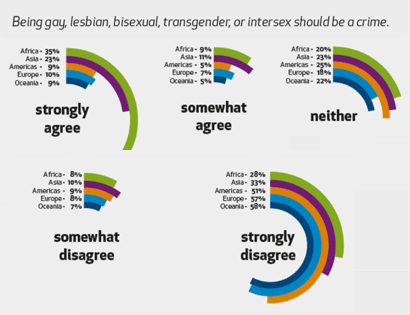Africa lags in largest ever global survey of attitudes towards LGBTI people
 The largest ever global survey on attitudes towards LGBTI people has found that Africa is among the world’s most negative regions when it comes to sexual minorities.
The largest ever global survey on attitudes towards LGBTI people has found that Africa is among the world’s most negative regions when it comes to sexual minorities.
The report, The Personal and the Political: Attitudes towards LGBTI People around the World, surveyed nearly 100,000 individuals in 65 countries.
Significantly, the survey reached environments highly hostile to LGBTI people, such as Saudi Arabia and Iraq, resulting in the largest investigation of attitudes towards LGBTI people around the world ever conducted.
On a promising note, at a global average, the survey shows that 67% of the world (strongly or somewhat) agrees that human rights should be applied to everyone regardless of their sexual orientation or gender identity or expression.
“All the countries surveyed returned results over 50% in favour of this proposition, even those considered among the most hostile to sexual and gender minorities,” comments Aengus Carroll, co-author of the research. “This clearly demonstrates that countries’ legal policy and international practice can be very contradictory when compared to attitudes declared by their citizens.”
When people know each other first-hand, a de-stigmatising effect is often produced, countering the stereotyping too often perpetuated by religious and political leaders, as well as in media.
At the global level, 46% of respondents know someone lesbian, gay or bisexual, while only 28% of respondents directly know someone who does not identity with the gender they were assigned at birth, or identifies as transgender.
 Other data seem to show a significant bridge between what people feel is permissible at the personal level and the laws that govern sexual behaviour and expression: 38% of respondents globally feel that adults should be allowed to have private, consensual same-sex relationships. Interestingly, when extending the question to a matter of law (‘Should being lesbian, gay, bisexual, trans or intersex be a crime?’), it is seen that only 26% feel that such behaviours or expressions should be criminalised.
Other data seem to show a significant bridge between what people feel is permissible at the personal level and the laws that govern sexual behaviour and expression: 38% of respondents globally feel that adults should be allowed to have private, consensual same-sex relationships. Interestingly, when extending the question to a matter of law (‘Should being lesbian, gay, bisexual, trans or intersex be a crime?’), it is seen that only 26% feel that such behaviours or expressions should be criminalised.
“Public attitudes in both hostile and friendly nations are not as extremely negative as might have been feared,” commented Renato Sabbadini, Executive Director at ILGA. “However, this does not erase the fact that violence and discrimination inflicted on sexually and gender diverse people all around the world continues unabated, and indeed is increasing in places. Too often we still see sexual and gender minorities being convenient scapegoats for leaders who are looking for support from more conservative sectors of their society.”
Africa almost consistently has the most negative attitudes towards LGBTI people. Nine African states were included in the survey: Algeria, Egypt, Ghana, Kenya, Morocco, Mozambique, Nigeria, South Africa and Zimbabwe. All criminalise homosexuality, except South Africa (which was the most LGBTI affirming of the nine).
The African states surveyed returned the highest percentage of agreement with the statement that same-sex desire is a Western world phenomenon, with 47% either strongly or somewhat agreeing. On the African continent around 44% of respondents also feel that being LGBTI should be a crime. These attitudes seem most prevalent in Ghana (54%), Nigeria (59%) and Uganda (53%), and least agreed to in South Africa (where 61% disagree with this proposition).
Proponents of traditional values often attempt to denaturalise diversity by framing it as something chosen or adopted in a person, rather than being an innate attribute. At the global level, only one quarter (23%) of respondents seem to feel people are ‘born that way’ (only 15% in Africa), and only 21% of the world either ‘strongly’ or ‘somewhat’ disagree that gender is assigned at birth and always fixed (17% in Africa).
 On the other hand, though, it is evident that attitudes are changing: 52% of respondents either strongly or somewhat agree that bullying of LGBT young people is a significant problem; 65% of respondents globally have ‘no concerns’ if their neighbour were gay or lesbian (with extremes ranging from a 43% found in Africa to the 83% recorded in Oceania).
On the other hand, though, it is evident that attitudes are changing: 52% of respondents either strongly or somewhat agree that bullying of LGBT young people is a significant problem; 65% of respondents globally have ‘no concerns’ if their neighbour were gay or lesbian (with extremes ranging from a 43% found in Africa to the 83% recorded in Oceania).
“Sexual and gender minorities are often the first casualty when traditional values are being appealed to,” comment Ruth Baldacchino and Helen Kennedy, Co-Secretaries General at ILGA. “This is why this global survey, with its evidence-based and non-anecdotal data, is a powerful tool for the advancement of human rights of LGBTI people around the world.”
“Information and knowledge can indeed contribute to changing the world and the lived realities of many people worldwide who are still facing human rights violations,” they said.
The survey was conducted by the International Lesbian, Gay, Bisexual, Trans and Intersex Association (ILGA) with Canadian technology company RIWI Corp. and in partnership with the US entertainment brand Logo.
Leave a Reply